I started with this forged blank (once the design and drawing of the required part was finished):
BLANK
Okay, that is a huge billet (dia 400mm x 90 mm thick = 90kg), but is was donated.

I'm finally starting to make some concrete progress in my quest to bolt a Rover V8 engine to a Audi 016 transaxle.
I started with this forged blank (once the design and drawing of the required part was finished):
BLANK
Okay, that is a huge billet (dia 400mm x 90 mm thick = 90kg), but is was donated.
Went to see a mate with a CNC machine centre, large lathe etc. 2 days later, picked up this.
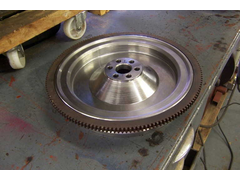

FLYWHEEL BACK
The finished part is dia 300 mm x 64 mm thick, weighed 7 kg (without ring gear).
Which fits like this:
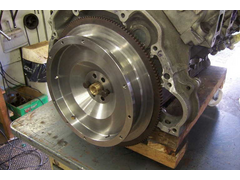

FLYWHEEL FRONT
I have positioned the ring gear closer to the engine than on the standard Rover, to the extent of having to relieve slightly some of the casting webs
on the back of the block.
Now I just have to make this:
PLATE
This is the the (final) prototype adaptor plate, machined in supawood to confirm the hole positions before I have the real one cut from aluminium. To
keep the adaptor plate down to a thickness of 16 mm, the ring gear will run in the recess in the thickness of the adaptor plate.
I will update as further progress is made.
Cheers
Fred WB
PS - Should this rather have been posted in the "Engine and Transmission section?
I love people that engineer their way round a problem... no matter what.
Looks great.
quote I love people that engineer their way round a problem... no matter what.
Being a South African and has little choice but to do it.
He also has good engineering culture that will do what you ask. Come to Scotland and we have to pull teeth to do anything a little differant for a
million pounds charge.
That is unbelievable!
--Chris
Not if you come to us! You can walk away with a one-off part and your teeth intact!! (unless you've been on the Irn-Bru too much...). We can now
provide CNC machined components to your spec' - one-off, prototype, low volume, etc.
Excellent job Fred, good to see you're making significant progress.
Great progress Fred, but may I ask how much that flywheel weighs? I presume it's steel and not ally?
Ned.
Ned, you muppet, look under the 2nd picture
"The finished part is dia 300 mm x 64 mm thick, weighed 7 kg (without ring gear)."
No offence meant
It is steel.
Thanks for kind words guys.
Just picked up a 1000mm x 500mm x 16 mm plate of 6082 T6 alloy at bargin price of R35 (UKP 2.8) a kilo, so keepin up the momentum
Cheers
Fred WB
I thought it looked a bit hefty too, Ned! But obviously not. Still, at least I avoided being called a muppet for once in my life! 

If it was me, tho' I'd have had a lot more holes drilled in it!!! 


[Edited on 9/6/05 by tadltd]
[Edited on 9/6/05 by tadltd]
Excellent, well thought out bit of old fashioned engineering there Fred. That's the way things were done before forums and high disposable
incomes. 
Forgot to mention that the original rover flywheel weighs 14 kg
The wall thicknesses of all areas of the new flywheel are mostly 6 mm, with the conical centre section 8 mm thick.
Cheers
Fred WB
[Edited on 10/6/05 by Fred W B]
Fred, here's a slightly clearer version of your avatar if you'd like it:Image deleted by owner
Thanks Rorty, avatar now changed. It does look better.
Cheers
Fred WB
hands up to that one, must stop skim reading 
imho 7kg is quite god for what you've got there, well done. i suppose the clutch will bring hte weight up, but as you rightly say it will be
lighter than the original so will aid the speed the engine can spin up nicely..
Ned.
hmmm, very impressed.
How much to have another one of those done up? I have a buddy who would like to stick a rover V8 in his Europa.
To finally finish the story, here is the finished alloy adaptor plate, looking from the engine side. It is 16 mm thick, with an 8 mm recessed area for
the flywheel. The large countersinks are for the plate to trans attachment bolts.
[img][/img]
Here you can see 3 x M6 countersinks that are tapped into the engine to locate the plate, and the trans attachment bolts in position
[img][/img]
Plate to engine bolts and clutch fitted. One trans bolt only just cleared the RV8 starter motor, with the head cut off on one side. The slots in the
ends of the trans bolts are to hold the bolts with a screwdriver while you run the nuts up.
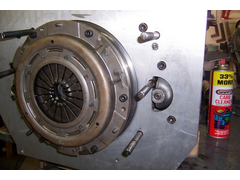

clutch
Here you can see one of 3 spring pins that locate the trans on the plate.
[img][/img]
Complete assembly bolted up
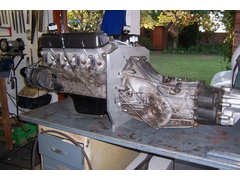

drive train
Trans case relieved to clear starter motor
[img][/img]
Fit of ring gear in plate. You can also just about see the countersunk head of one of the trans bolts, opposite the nut on the starter solenoid bolt
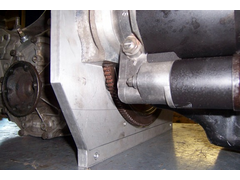

ring clear
Cheers
Fred WB
so simple yet so affective
well done fred